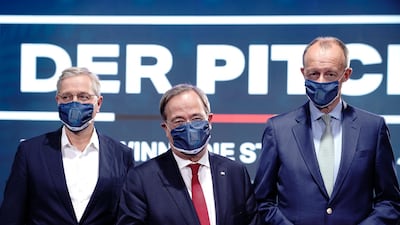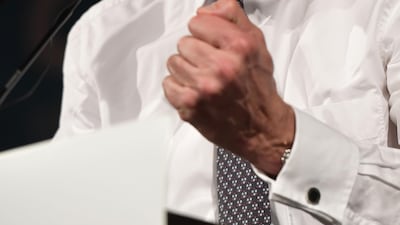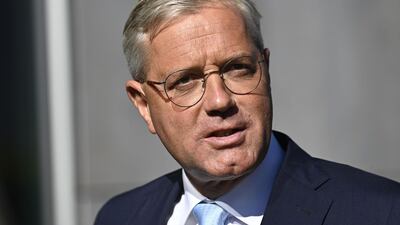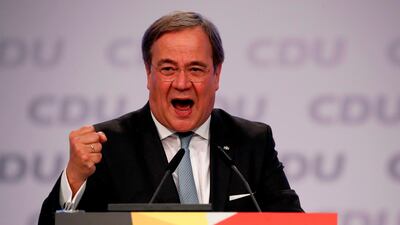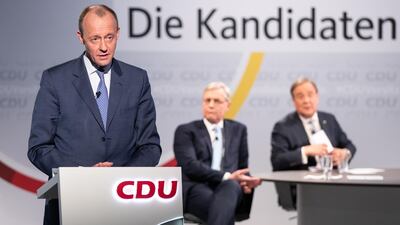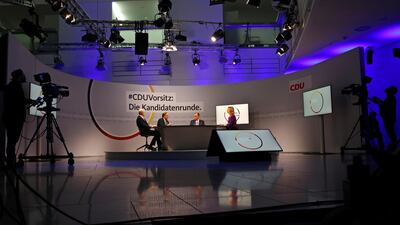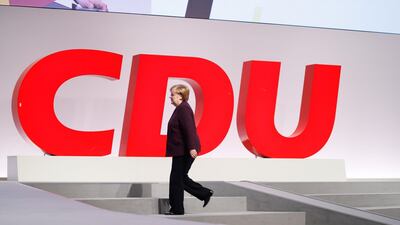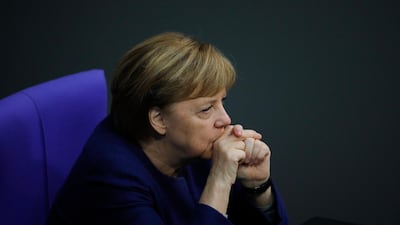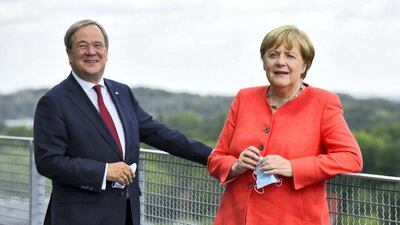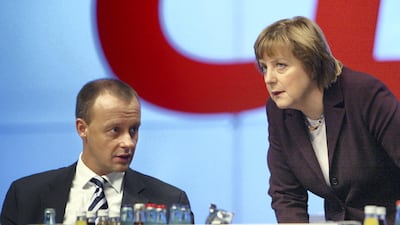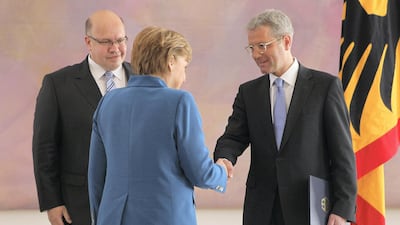Members of Germany’s ruling Christian Democrats will begin choosing a likely successor to Chancellor Angela Merkel on Saturday, after surging coronavirus cases in December forced the vote online.
Electronic balloting will decide which two of the three candidates – Armin Laschet, Friedrich Merz and Norbert Rottgen – go through to the second round of the contest and indicate who might emerge as the leader of Germany’s largest party and take pole position to become its next chancellor.
The Christian Democratic Union (CDU) has been without a leader since February when Annegret Kramp-Karrenbauer, Ms Merkel's protegee, resigned after the party's worst election performance in Hamburg.
During a leadership campaign muted by pandemic restrictions, the candidates have not risked putting their heads above the parapet on key issues and have done little to create excitement or build confidence among party voters.
With the departure of Ms Merkel after 15 years as chancellor looming, Germany's next leader will have to contend with an ascendant far-right AfD party, and tackle major foreign policy challenges, such as keeping the nuclear deal with Iran alive – especially after it confirmed earlier in January an accelerated programme towards weapons-grade uranium.
Armin Laschet – coal-backing favourite divides opinion
Only one of the candidates, Mr Laschet, has won an election for state or national office before.
Although he is considered by many to be the favourite, one analyst suggested that his position as chief minister of North Rhine-Westphalia might be damaging his campaign.
Dr Kamil Marcinkiewicz, a political scientist at the University of Hamburg, told The National that Mr Laschet is "held accountable for the decisions made by his government, so it's more difficult for him to promise a new start".
Support for Germany’s coal industry sets Mr Laschet at odds with the country’s Green party, currently second in the polls, which he may need as a coalition partner.
Judy Dempsey, a senior fellow at Carnegie Europe, said Mr Laschet, 59, lacked progressive credentials: “He doesn’t discuss climate change, he doesn’t discuss foreign policy, he doesn’t discuss modernising the CDU, he doesn’t discuss opportunities for women.”
Despite this, she told The National, Mr Laschet has Ms Merkel's backing "for the moment" and enjoys the support of many others in the CDU leadership.
Friedrich Merz – Merkel's 'arch-enemy' yet to define policy position
In contrast, Mr Merz, 65, a millionaire corporate lawyer, has been an opponent of the chancellor since stepping down as opposition leader in 2002 in her favour.
Ms Merkel’s “arch enemy” had tried to soften his image during the campaign, Ms Dempsey said, but a recent boast that he had the support of women led to retaliation on social media. He is unlikely to find support among female CDU members, she said.
A qualified pilot, analysts say Mr Merz is yet to set out a clear course for Germany as a candidate.
“It’s very hard to know what he stands for,” Ms Dempsey said. “He wants tax reform but he doesn’t spell out which direction Germany must go in terms of digitisation, artificial intelligence or shaking up the bureaucracy.”
As the most conservative candidate, Mr Merz could, however, be better able to check the far-right, Dr Marcinkiewicz said.
Mr Merz, he said, “stands for the old-style conservative CDU from the pre-Merkel era and some expect this may attract some voters who left for the AfD".
”This strategy worked in Austria, where the more nationalistic rhetoric of Sebastian Kurz reinvigorated the People’s Party.”
But such a strategy would be risky because it may alienate moderate voters won by Ms Merkel, he said.
Norbert Rottgen – the environmentalist and 'unknown quantity'
For Dr Marcinkiewicz, Mr Rottgen, 55, is the opposite to Mr Merz.
A centrist and something of an unknown quantity, Mr Rottgen has been the chairman of the Bundestag’s influential Committee on Foreign Affairs since 2014.
His interest in environmental issues makes him well suited to leading a coalition with the Greens and reflects the preferences of German voters, Dr Marcinkiewicz said, and that “his demeanour most resembles the calm, unifying image of Angela Merkel”.
Ms Dempsey said Mr Rottgen lacked the strong party support enjoyed by Mr Laschet.
The soaring popularity of Markus Soder, leader of the Christian Social Union (CSU), the CDU’s Bavarian sister party, could threaten each of the three candidates if he decides to run to succeed Ms Merkel as the parties’ joint candidate, she said.
“It’s unusual for the CSU to do this and every time they’ve done it they’ve failed. But at the moment he’s incredibly popular and he’s young. Soder may make the calculation that he can throw his hat in the ring.”
Ms Merkel’s planned resignation means there will be no incumbent chancellor seeking re-election for the first time since post-war West Germany’s inaugural vote in 1949.
Germany is approaching an unpredictable election while a second wave of coronavirus infections tests Ms Merkel's handling of the pandemic.
Growing concern over a ponderous vaccination programme threatens to erode support for the CDU with six state elections and the federal elections on the horizon.
With the subdued leadership campaign so far failing to generate excitement, the failure to produce a candidate capable of maintaining the CDU’s hold on power could tarnish the legacy of Europe’s longest-serving leader.
